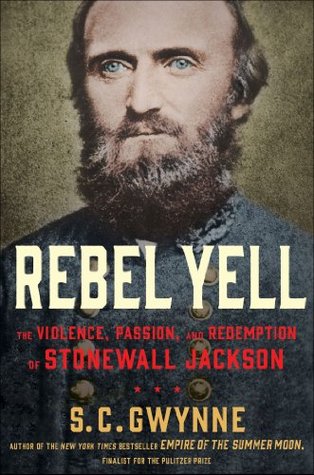More on this book
Community
Kindle Notes & Highlights
by
S.C. Gwynne
Read between
March 12 - March 29, 2024
“Captain, my religious belief teaches me to feel as safe in battle as in bed. God has fixed the time for my death. I do not concern myself about that, but to be always ready, no matter when it may overtake me. That is the way all men should live, and then all would be equally brave.”14
According to one observer, he despised Jackson, who was in most ways his opposite and, in any case, was not from an F.F.V. (First Family of Virginia) and so not worth Magruder’s time.
To die on the battlefield is relief compared to the death in a contaminated hospital.”23
“There is no danger! See? I am not hit!” (He said later this was the first and only lie he ever told.)
A visiting Englishman, discussing history, once said to him, using a typically British prefix, “You remember, Major, that at this point Lord Burleigh was Queen Elizabeth’s great counselor,” Jackson immediately interrupted him, saying, “No, I don’t remember, for I did not know it.”7 When later asked whether he understood that the man’s saying “you remember” was just a figure of speech, Jackson said, “I am quite aware that he did not intend to gauge my knowledge of history. But nothing would have induced me to make the impression on him that I knew what I did not.”8 Similarly, when someone used
...more
No matter what was happening or what interesting or momentous conversation was under way, Major Jackson would rise and leave, without fail, at 9:00 p.m.
As with everything else, he did not change his private behavior in public: from his days in postwar Mexico City onward he would bring his own food to dinner parties.
He was a prodigious walker, traveling five miles a day, but he also engaged in the sort of strange-looking leaping exercises that his army colleagues at Fort Hamilton had noted.
The war they had enlisted in had begun as an exercise in glory and freedom. Under Jackson, it began to look more like grim servitude.
Piecemeal attack—which ceded the advantage of massed firepower—was one of the cardinal sins committed by generals in the Civil War, even the best ones. Jackson was learning about that, too. But he would never learn to share information freely with subordinates; it was a glaring weakness, and it would haunt him here and throughout the war.
So Garnett and other commanders, who knew nothing about the battle plan, would know nothing about enemy troop strength, either. It is safe to say that no other general, on either side, would have chosen to proceed this way.
But because many of the slaves were rented out to nonslaveholding families for agricultural labor or housework, the institution was more pervasive than the numbers showed.
The answer was that ownership per se was only part of it; the institution pervaded the South on less apparent economic levels.
One need only exchange Union for Confederate commanders to see what might have happened to it. Jackson would have cut such an army to pieces on the road.
Shields was wrong: both he and Frémont had failed together, and thus, together, they had “saved” Jackson.
And while cannons were very satisfying to shoot, watch, and listen to, they often did little significant tactical damage.
If McClellan and his generals understood for a moment what Lee was doing, and acted on it, they would have little trouble smashing Richmond’s defenses.
It was a kind of miracle, in fact, that McClellan was finally sending the men forward at all.
Though few people understood the Seven Days battles at the time, the resounding Confederate victory was a good deal more pyrrhic than it looked.
But the irony here—and it was grand and tragic irony—was that Lee’s counteroffensive actually marked the end of that brief, fragile period when the Union could still be preserved without making slavery the war’s central issue—without, in other words, destroying the South.
Jackson hated deserters with a special passion. He had only restrained himself from shooting them before because public opinion wouldn’t have tolerated it.
“I feel some little pride,” he wrote his wife, “in having, with a beaten and demoralized army, defeated Lee so utterly, & saved the North so completely.”43 He had of course not defeated Lee at all. He had made a series of uncoordinated, piecemeal assaults and had failed to do what he needed to do to win, which was to move simultaneously against Lee’s center and right while attacking his left.
After the Emancipation Proclamation, the only way the war was going to end was if one side won it by sheer force of arms—something the Confederacy would simply never be able to do. The proclamation also marked the beginning of the end of the South’s long dalliance with the European powers. Soon enough, they would gently withdraw to permanent onlooker status, having decided that the Confederacy was unlikely to win.
Death in war was neither picturesque nor peaceful, and dying bravely didn’t make you any less dead, or mean that you would not be dumped into the cold earth of a mass grave with everyone else, brave and not brave.


